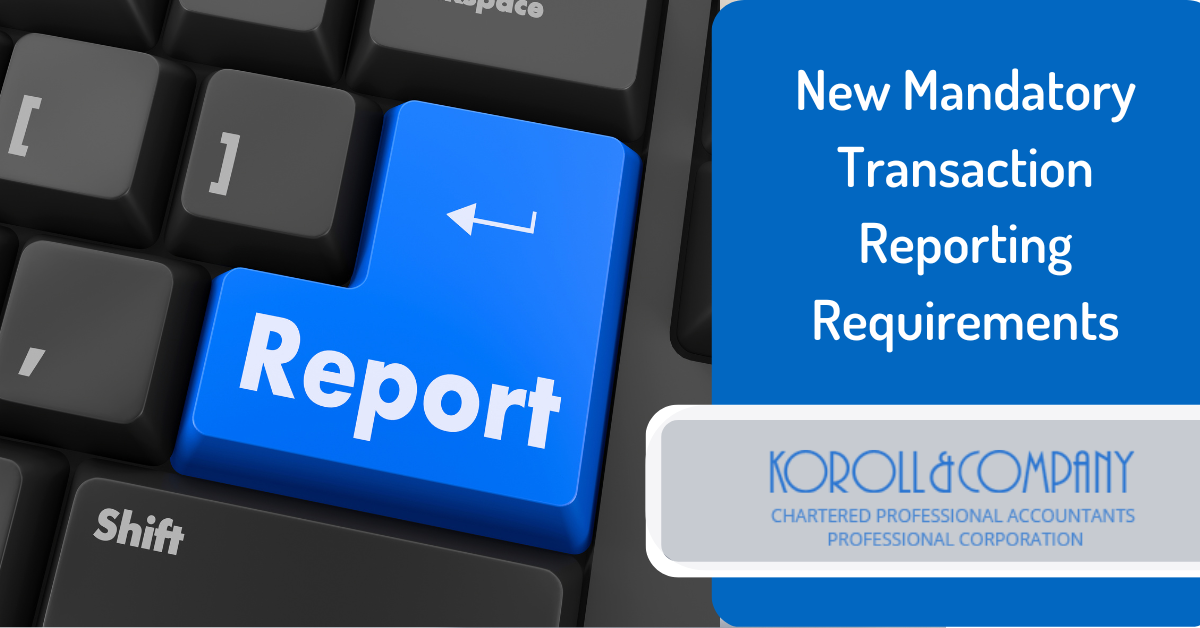
In 2021, the federal budget announced that there would be a consultation regarding reporting requirements for certain transactions. This is because the government recognized a lack of “timely, comprehensive and relevant information on aggressive tax strategies” as a major challenge faced by the CRA and tax authorities worldwide.
According to the budget, the consultation would address:
- Changes to existing reportable transaction rules in the ITA (Income Tax Act)
- New requirements to report notifiable transactions and uncertain tax treatments
- Penalties for failure to report
- Extensions to report in certain circumstances
In February 2022, draft legislation and a backgrounder were released.
Reportable transactions
Under current legislation, transactions must be reported if it is an avoidance transaction as defined by the anti-avoidance rule and meets two of three generic hallmarks.
An avoidance transaction is defined as:
“A single transaction or one that is a part of a series of transactions where the single transaction or the series results directly or indirectly in a tax benefit, unless the transaction is carried out primarily for bona fide purposes other than to obtain the tax benefit.”
The three generic hallmarks are:
- Contingent fee arrangements – The advisor is entitled to a fee related to the transaction based on the amount of a tax benefit, contingent on obtaining or failing to obtain a tax benefit or is based on the number of people involved in the transaction.
- Confidential protections – Anything that prohibits the disclosure of relevant details regarding the avoidance transaction to anybody, including the CRA.
- Contractual protections – Any form of insurance or other protection that protects a person against failure of the transaction to achieve a tax benefit OR pays for or reimburses any expenses that are incurred from a dispute of the transaction’s tax benefit.
The proposal would change this so that only one of the three hallmarks would have to be met for avoidance transactions to be reportable.
In addition, the definition of avoidance transaction would be amended to include any transaction if it can be reasonably concluded that the main purpose is to receive a tax benefit.
The contractual protection hallmark would also be updated to exclude protections offered in the context of normal commercial/investment transactions to a broad class of people, such as standard tax risk insurance.
The proposed changes would make it so reportable transactions must be shared within 45 days following the person entering or becoming contractually obliged to enter into the transaction. These reporting obligations extend to the promoter or advisor, as well as some third parties. Exceptions are made where solicitor client privilege applies.
Notifiable transactions
New requirements will require the reporting of important information related to notifiable transactions. A notifiable transaction will include “both transactions that the CRA has found to be abusive, and transactions identified as transactions of interest (i.e., where more information is required to determine if a transaction is abusive).”
Description of notifiable transactions will be detailed enough for taxpayers to comply with the rule and will include examples. Samples includes in the background are:
- Manipulating Canadian-controlled private corporation status to avoid anti-deferral rules applicable to investment income
- Straddle loss creation transactions using a partnership
- Avoidance of deemed disposal of trust property
- Manipulation of bankrupt status to reduce a forgiven amount in respect of a commercial obligation
- Reliance on purpose tests in section 256.1 to avoid a deemed acquisition of control
- Back-to-back arrangements
Further details of each example were provided in the backgrounder released in February.
Transactions would be designated notifiable by the Minister of National Revenue with agreement from the Minister of Finance.
Like reportable transactions, notifiable transactions must be reported by the taxpayer, as well as the advisor or promoter, within 45 days following the person entering or becoming contractually obliged to enter into the transaction.
This disclosure will not change how the transaction is treated. It would simply provide information on:
- the expected tax treatment and benefits
- contractual protections an contingent fees
- the transaction so the CRA can understand it’s structure
- the persons required to file an information return for the transaction
Failure to report notifiable or reportable transactions will result in substantial penalties for the taxpayer and the advisor or promoter.
The taxpayer penalty would be $500 per week for each failure to report up to $25,000 or 25% of the tax benefit (whichever is greater). Advisors and promoters would face penalties of 100% of fees charged plus $10,000 plus $1,000 for each day they fail to report up to $100,000. This would be applied to each failure to report.
Late filing penalties will not apply to 2022 transactions that happen before the date of royal assent, when these drafted legislations are enacted.
Uncertain tax treatments
In addition to the above changes, corporate taxpayers would also be required to report uncertain tax treatments where they meet certain conditions.
These conditions include that the corporation:
- Is required to file a Canadian tax return
- Has $50 million or more in assets at the end of the year
- Has audited financial statements prepared using IFRS or other country-specific GAAP relevant for domestic public companies
- Has uncertainty related to income tax reflected in those audited financials
These uncertain tax treatments would be reported at the same time your corporation’s tax is due. Failure to report would result in a penalty of $2,000 per week up to $100,000 for each uncertain tax treatment.
Reassessment period
The reassessment period for these mandatory disclosures would not begin until the taxpayer has complied with the new reporting requirements. As such, if a taxpayer does not comply, the reassessment would not become statute barred.
These new rules will place additional burdens on taxpayers and make reporting for notifiable transactions, reportable transactions, and uncertain tax treatments imperative.
For help understanding how these changes affect you, please contact Koroll & Company today.






